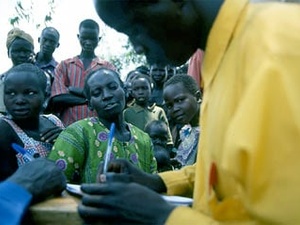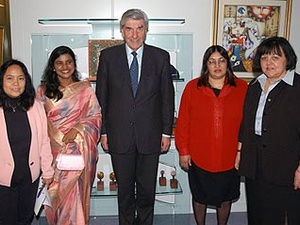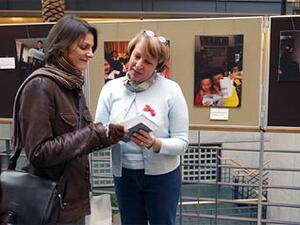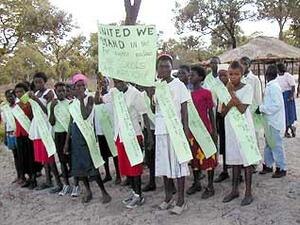Afghanistan Humanitarian Update No. 27
Afghanistan Humanitarian Update No. 27
At a Glance:
- High Commissioner Ruud Lubbers to urge Pakistan to open borders, refrain from deporting Afghans.
- Over 1,300 refugees in Pakistan staging camp
- Eight thousand in camps on Afghan side of Iranian border
- US$ 7.1 million Italian donation takes total pledged to UNHCR to $52 million
High Commissioner's Visit to Pakistan
The U.N. High Commissioner for Refugees, Ruud Lubbers, is currently in Islamabad, on the second stage of his visit to Pakistan. Over the next two days, Mr. Lubbers has confirmed meetings with the Ministers of the Interior, Foreign Affairs and SAFRON (the ministry charged with refugee affairs).
Lubbers, who is also tentatively scheduled to meet on Tuesday with Pakistan's President Pervez Musharraf, will be reiterating a call for open borders. Lubbers will also urge greater flexibility on deciding which Afghan refugees meet the criteria of vulnerability. Pakistan's border with Afghanistan remains officially closed but in response to UNHCR's pleas, Pakistani authorities are allowing in vulnerable individuals - women, children, the elderly and the wounded. Lubbers is expected to ask Pakistan to also include men fleeing forced conscription in the vulnerable category.
UNHCR says testimonies of people fleeing from Afghanistan to Pakistan consistently indicate that both the ruling Taliban and the opposition are trying to conscript men to fight in the war.
Lubbers is also expected to urge Pakistan to issue public assurances to Afghans that those who have already fled to Pakistan will not be deported. This would enable Afghan refugees already in the country to come forward and seek shelter and aid in 15 refugee camp sites readied by UNHCR, that can hold up to 150,000 people. At a conservative estimate, at least 80,000 Afghans have crossed into Pakistan from Afghanistan since September 11th. But only a small fraction are accommodated in a refugee staging camp in the Quetta area. Most Afghans have blended into existing refugee settlements or have found accommodation with the local population. Many of them are believed to be living in extremely difficult conditions without access to international aid. UNHCR officials recognize the validity of Pakistan's fear of security problems in the wake of a possible large influx of Afghan refugees and the need to separate civilians from persons who could represent a security risk.
Over the weekend, Mr. Lubbers spent two days in Quetta, in the south-western province of Baluchistan, where he had productive meetings with the Governor and other senior provincial officials. He also visited the Chaman border crossing for a first-hand view of the situation at the Afghan border, and met newly arrived refugee families in the Killi Faizo staging camp close to the border. He also visited Darra, one of the three refugee sites identified in the Chaman Area. On Wednesday, after concluding the Pakistan leg of his visit, the High Commissioner will fly to Iran.
New Arrivals at Killi Faizo Staging Camp
On Monday, by the late afternoon, 264 Afghans (54 families) had been permitted to enter the Killi Faizo staging camp in Baluchistan, with more families said to be in the process of walking from the border to the camp. A total of around 1,350 individuals have now been accepted into Killi Faizo since the camp opened a week ago.
Controversial Camps on Iranian Border Now Hold 8,000
UNHCR has been increasingly concerned about the security and capacity of two camps in Nimruz province, on the Afghan side of the border with Iran. Many Afghans approaching the border express fears of forced recruitment by the Taliban, or of being used as human shields or being targeted by bandits and smugglers operating in the border area.
As of late Sunday evening, the population in the Makaki camp about two kilometres inside Afghanistan, in Taliban-controlled territory, had risen to approximately 7,800 persons (1,117 families - 987 families registered and received; 130 families still awaiting registration). Makaki camp is operated by the Iranian Red Crescent Society (ICRS). According to IRCS officials, the agency has ceased to register new arrivals since Makaki camp was only designed to hold 1,000 tents and is already close to reaching that limit.
The number of Afghans in Mile 46 (the other IRCS-operated camp in a Northern Alliance controlled pocket in Nimruz province) is still 568 persons (129 families). It seems, however, that new arrivals approaching Makaki camp are now being referred to the Mile 46 camp. This means that refugees are exposed to the additional danger of crossing the demarcation line - the Helmand River, south of Milak border post - between the Taliban and the Northern Alliance forces.
Funding
By Monday, UNHCR had received $52 million in cash contributions, including newly confirmed contributions of $7.1 million from Italy, $20,000 from Chile, $2.5 million from Denmark and $500,000 from Greece.
Confirmed Cash Contributions as of 29 October (US$)
| Australia | 1,951,220 |
| Canada | 759,494 |
| Chile | 20,000 |
| Czech Republic | 107,325 |
| Denmark | 3,384,887 |
| ECHO | 1,836,545 |
| Finland | 772,213 |
| Germany | 5,164,561 |
| Greece | 500,000 |
| Ireland | 349,789 |
| Italy | 7,113,725 |
| Liechtenstein | 62,112 |
| Luxembourg | 341,451 |
| Monaco | 91,827 |
| Netherlands | 5,000,333 |
| Norway | 3,331,462* |
| Private Donors | 2,111,852 |
| Sweden | 1,398,401* |
| United Kingdom | 3,676,471 |
| United States of America | 14,000,000 |
| TOTAL CONTRIBUTIONS | 51,973,668 |
* Formal government pledges which are awaiting finalisation of contractual formalities






